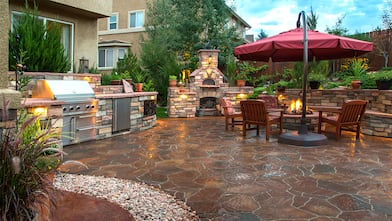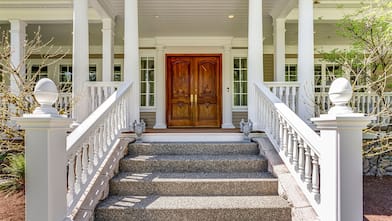The average cost of concrete sealing is $1,250 to $1,750
The cost to seal concrete is around $1,500 for a 1,000-square-foot area. Concrete is one of the most durable materials on your property. A great way to keep your concrete looking pristine and ensure it lasts for years to come is by sealing it. Regardless of the location, whether it is in the basement or the driveway, sealing concrete can help preserve its look and also make it more resistant to the elements.
How Much Does It Cost to Seal Concrete per Square Foot?
When sealing new concrete, the cost per square foot is around $1.50. The final price depends on the type of material, dimensions, and location that needs sealing, plus the labor. Take note that if you have a small area that needs sealing, a professional concrete sealer may charge you a flat fee regardless of the square footage of the job.
“When sealing concrete that is at least a year old, the cost of cleaning and properly preparing the surface must also be considered,” says Expert Review Board member Matt DiBara of DiBara Masonry. “This process can include work such as removing all adjacent furniture, power washing the area, a light acid wash and neutralizing, and installing tape and plastic to protect windows and doors.”
Although this process varies based on how much cleaning and preparation is needed, DiBara says it typically costs between $1 and $1.75 per square foot for older concrete areas that can benefit from the look and feel of a fresh coat of sealer.
A Hidden Benefit of Sealed Concrete
Did you know that sealing concrete can not only look great, but also protect your investment for years to come? Much like the lacquer coating on a hardwood floor, or the coating of paint on your car or house, a good sealer acts the same way. By reducing how much water penetrates the surface, your concrete and its rebar can remain protected from the elements which over time may reduce cracking and discoloration.
How Much Does It Cost to Seal Concrete Yourself?
Sealing your concrete yourself is the most affordable option to tackle this task. Concrete sealers cost between $0.10 and $0.75 per square foot. Many sealers are very DIY-friendly, making this an appealing project for homeowners. All you need are the right tools and enough time. If you decide to hire a local driveway contractor, it will cost between $1.25 and $1.75 per square foot.
Pro Tips For DIY Concrete Sealing
Wait at least 28 days after pouring any new concrete before sealing it. For indoor and heavily shaded areas, it may require an additional week or two for all the moisture to evaporate enough for the sealers to properly penetrate.
Make sure it hasn’t been sealed in the last four years. A simple way to check this is to place a teaspoon of water on the surface of your concrete. After about 20 seconds, the concrete will typically absorb some or all of the water. If none of the water penetrates the surface, it is likely sealed. In this case, it’s best to contact a professional to ensure you don’t install a different type of sealer over what is already there. If the water absorbs, your new sealer will likely do the same—and that means a green light for you to DIY.
Breaking Down the Costs
When it comes to the cost breakdown of sealing concrete, the two major factors are materials and labor. Keep in mind, concrete repairs that need to be done before sealing the surface will increase the project's total price.
Concrete Sealer Cost
When it comes to concrete sealers, the type you choose will influence the total cost. You should expect to pay around $16 to $50 per gallon. One gallon of sealer generally covers approximately 150 to 300 square feet. There are different types of concrete sealers, and some tend to be more affordable than others. For instance, acrylic sealers are usually less expensive than epoxy-based sealers.
Labor Cost
If you decide to hire a local driveway contractor, you should expect to pay around $1.25 to $1.75 per square foot plus any additional repairs needed. The cost may increase based on the type of sealer you choose, the physical location, and the dimensions of your driveway, basement, or concrete floor––wherever it is that you are sealing. If the area is small, you should expect the cost per square foot to be higher if your contractor charges a minimum fee.
Concrete Sealing Cost by Sealer Type
When choosing your concrete sealing, most sealer options are versatile and can work indoors and outdoors, both vertically and on flat surfaces. There are several concrete sealing products, formulas, and finishes. The cost varies based on the formula used in the sealer (some are water-based while others are oil-based).
Acrylic Sealers
Concrete sealers that are acrylic-based cost around $0.85 to $1.15 per square foot. They are some of the most affordable concrete sealers that you can use both indoors and outdoors.
Epoxy Sealers
When it comes to indoor sealers, epoxy is the best, thanks to its high-quality finish. The price ranges between $3 and $7 per square foot.
Polyurethane Sealers
You should expect to pay around $0.95 to $1.10 per square foot for polyurethane sealers, which tend to be a good choice in areas where the temperature fluctuates throughout the year.
Considerations for Different Concrete Areas
Basement
The best basement floor sealer is epoxy. Basements tend to see a decent amount of foot traffic, and epoxy will help protect your basement’s concrete floor from chipping, cracking, and general wear and tear. Another big benefit to putting epoxy in your basement is that it provides a waterproof finish. Just a couple of coats will keep moisture at bay and help prevent water damage in your basement. This is especially important if you plan to finish your basement and lay carpet, hardwood, or other flooring on top of the concrete.
Garage
Similar to basements, garages tend to see a lot of traffic—and not just of the “foot” variety! Most homeowners use their garages to store vehicles, which can put a lot of wear on the concrete floor. But if you enjoy spending time in the garage, whether tinkering with project cars or building DIY bird-houses, you’ll definitely want to put down a garage floor sealer to help protect it from nicks from dropped tools, or paint spills. Like basements, epoxy is the strongest option for a garage concrete sealer.
Driveway
With the constant coming-and-going of cars (and perhaps bikes, trikes, and ATVs?) on your driveway, it’s clear why it needs a sealant. The best driveway floor sealer is acrylic because it is a healthy mix of affordable, yet durable. Sealing your driveway with acrylic will extend its life while also improving its appearance. You’ll notice a glossier driveway, and a richer color tone, too. It typically takes less than a day to seal a concrete driveway.
Sidewalks and Patios
Concrete sidewalks and patios need sealers, as do concrete steps. These high-traffic areas are prone to chips and cracks. Concrete steps, in particular, are susceptible to crumbling—which poses a safety risk in addition to being just plain unattractive.
Concrete Countertops
If you have concrete countertops in your kitchen, sealing them can help protect against stains from food and liquid (we’re looking at you, red wine). Good concrete countertop sealers are epoxy or polyurethane, as they are both considered safe for food preparation. Both types also cure to create a nonporous surface ideal for being clean. that can be wiped clean and sterilized, making them generally recognized as safe for food preparation.
FAQs About Concrete Sealing

How do I seal concrete?
When you seal concrete, you need to ensure that the surface area is thoroughly cleaned, dried, and repaired. Once it’s ready, you'll use a painting roll, a paintbrush, or a pump sprayer to apply the sealer. Which item you use will depend on the thickness of the sealer you choose.
Why should I seal my concrete driveway?
As with asphalt driveways, you also need to seal concrete driveways to provide an additional layer of protection. Sealing your driveway can extend its lifespan, preserve its look, protect it from the elements, and help prevent cracks, deterioration, and erosion. Plus, sealed surfaces are water-resistant, make cleaning stains easier, and offer protection from salt damage in places where it snows.
How often should I seal my concrete?
You should seal your concrete every two to three years or more depending on the use, wear of the surface, and type of sealer you choose. Areas that see heavy traffic or extreme ice and snow may require more frequent sealing.
When is the best time to seal my concrete driveway?
The best time to seal your concrete driveway is sometime in the spring and fall when the temperature is above 55 degrees.
Should I pick a topical or a penetrating sealer for my project?
There are two major categories when it comes to concrete sealers: topical and penetrating. The surface you’re sealing will determine the type of sealer you choose.
Topical sealers adhere to the surface of concrete to create a protective layer. In many cases, this is all you need for concrete that sees light to moderate traffic, such as your basement. Keep in mind that because topical sealers provide a thin coat, this type of sealer is more susceptible to wear and tear.
Penetrating sealers, on the other hand, bond with the free lime in the top layer of concrete to form calcium silicate, which prevents liquid from passing through. This type of sealer protects the surface from water, oil, and gasoline spills. This type is a better choice for outdoor areas like concrete driveways and stairs that face the elements.
But if you’re working with a pro, make sure to ask them what they think would be the best choice for your project. If you are in the hiring process, it’s always good to request at least three quotes.
What other projects should I do at the same time?
When you are sealing your concrete, especially if it’s your driveway, make sure to clean out your landscaping while you’re at it. And, as you’re sprucing up your outdoors, why not go ahead and plant some new flowers, too?




